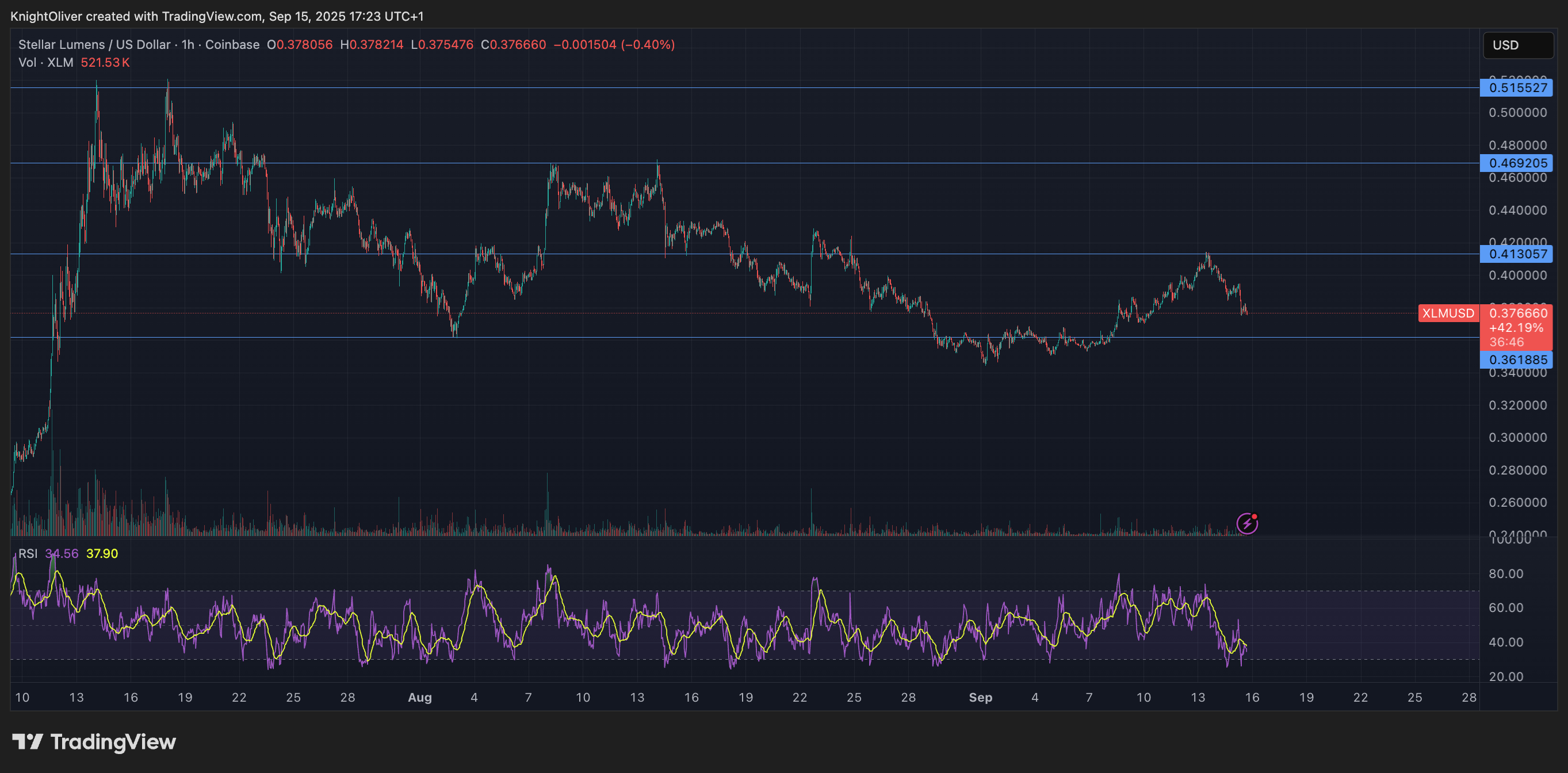Uncategorized
U.S. Recession Odds Surge in Prediction Markets on Tariff Shock. What Next for BTC?

U.S. recession fears are in the air following President Donald Trump’s tariff plan, with prediction platforms Polymarket and Kalshi indicating heightened concerns the economy will take a hit.
On Polymarket, a decentralized prediction platform, the chance of the country slipping into recession this year topped 50% for the first time since the betting contract «US Recession in 2025» began trading early this year. The contract’s Yes shares soared to over 50 cents from 39 cents in less than 24 hours.
The contract will resolve to Yes if the National Bureau of Economic Research (NBER) confirms a recession at any point before Dec. 31. The other condition requires back-to-back quarterly contractions in gross domestic product.
Kalshi, a U.S.-based regulated prediction market, also points to heightened economic concerns among traders, with the probability of a 2025 recession rising to 54% from 40% .
Financial markets tend to be forward-looking and may react to rising U.S. recession odds by sending risk assets such as bitcoin (BTC) and other cryptocurrencies lower. At publication time, the S&P 500 futures traded 3% lower, pointing to severe risk aversion on Wall Street and offering bearish cues to bitcoin, which changed hands at $83,100, 1.5% lower in 24 hours.
The sweeping tariffs unveiled Wednesday set a base rate of 10% on all imports, plus higher taxes on 60 nations identified as worst offenders. China, the most heavily hit, warranted a 34% levy on top of the existing 20% charge, taking the total to 54%. The base tariffs go into effect on April 5 and the higher reciprocal rates on April 9.
While the Trump administration expects tariffs to rectify the large and persistent U.S. goods trade deficits, in the short run, they could add to domestic inflation and global instability. The latter could happen immediately if China, the European Union and others hit back with higher tariffs, starting a full-blown global trade war.
Risk-off to be short-lived?
Still, some observers say the tariff uncertainty might lead only to an economic slowdown rather than a full-blown recession.
«The threat of further tariff escalation remains a key concern, but our economic forecasts do not call for a recession in the US,» UBS said in a blog post. «In our base case, a wide range of selective tariffs and counteractions are likely to lead to slower economic growth compared to last year, but they should not prevent the US economy from expanding by around 2%—its historical trend rate—this year.»
As for financial markets, some observers say the tariffs are dovish, meaning the initial risk-off reaction could be short-lived and quickly reversed by expectations of Federal Reserve interest-rate cuts.
«Remember — tariffs are dovish, and big tariffs are very dovish,» Joseph Wang, operator of the research portal fedguy.com said on X, referring to his November post that detailed how big tariffs would lead to more rate cuts.
Wang argued that while tariffs are inflationary, they can be mitigated through foreign-exchange rates and are ultimately transitory. Meanwhile, damage to the business sentiment can be long-lasting, leading to unemployment, which the Fed would want to avoid.
Rates traders are already pricing a higher probability that the Fed will cut the benchmark borrowing cost in June, restarting the so-called easing cycle that began in September last year.
Uncategorized
Asia Morning Briefing: Fragility or Back on Track? BTC Holds the Line at $115K

Good Morning, Asia. Here’s what’s making news in the markets:
Welcome to Asia Morning Briefing, a daily summary of top stories during U.S. hours and an overview of market moves and analysis. For a detailed overview of U.S. markets, see CoinDesk’s Crypto Daybook Americas.
Bitcoin (BTC) traded just above $115k in Asia Tuesday morning, slipping slightly after a strong start to the week.
The modest pullback followed a run of inflows into U.S. spot ETFs and lingering optimism that the Federal Reserve will cut rates next week. The moves left traders divided: is this recovery built on fragile foundations, or is crypto firmly back on track after last week’s CPI-driven jitters?
That debate is playing out across research desks. Glassnode’s weekly pulse emphasizes fragility. While ETF inflows surged nearly 200% last week and futures open interest jumped, the underlying spot market looks weak.
Buying conviction remains shallow, Glassnode writes, funding rates have softened, and profit-taking is on the rise with more than 92% of supply in profit.
Options traders have also scaled back downside hedges, pushing volatility spreads lower, which Glassnode warns leaves the market exposed if risk returns. The core message: ETFs and futures are supporting the rally, but without stronger spot flows, BTC remains vulnerable.
QCP takes the other side.
The Singapore-based desk says crypto is “back on track” after CPI confirmed tariff-led inflation without major surprises. They highlight five consecutive days of sizeable BTC ETF inflows, ETH’s biggest inflow in two weeks, and strength in XRP and SOL even after ETF delays.
Traders, they argue, are interpreting regulatory postponements as inevitability rather than rejection. With the Altcoin Season Index at a 90-day high, QCP sees BTC consolidation above $115k as the launchpad for rotation into higher-beta assets.
The divide underscores how Bitcoin’s current range near $115k–$116k is a battleground. Glassnode calls it fragile optimism; QCP calls it momentum. Which side is right may depend on whether ETF inflows keep offsetting profit-taking in the weeks ahead.

Market Movement
BTC: Bitcoin is consolidating near the $115,000 level as traders square positions ahead of expected U.S. Fed policy moves; institutional demand via spot Bitcoin ETFs is supporting upside
ETH: ETH is trading near $4500 in a key resistance band; gains are being helped by renewed institutional demand, tightening supply (exchange outflows), and positive technical setups.
Gold: Gold continues to hold near record highs, underpinned by expectations of Fed interest rate cuts, inflation risk, and investor demand for safe havens; gains tempered somewhat by profit‑taking and a firmer U.S. dollar
Nikkei 225: Japan’s Nikkei 225 topped 45,000 for the first time Monday, leading Asia-Pacific gains as upbeat U.S.-China trade talks and a TikTok divestment framework lifted sentiment.
S&P 500: The S&P 500 rose 0.5% to close above 6,600 for the first time on Monday as upbeat U.S.-China trade talks and anticipation of a Fed meeting lifted stocks.
Elsewhere in Crypto
Uncategorized
Wall Street Bank Citigroup Sees Ether Falling to $4,300 by Year-End

Wall Street giant Citigroup (C) has launched new ether (ETH) forecasts, calling for $4,300 by year-end, which would be a decline from the current $4,515.
That’s the base case though. The bank’s full assessment is wide enough to drive an army regiment through, with the bull case being $6,400 and the bear case $2,200.
The bank analysts said network activity remains the key driver of ether’s value, but much of the recent growth has been on layer-2s, where value “pass-through” to Ethereum’s base layer is unclear.
Citi assumes just 30% of layer-2 activity contributes to ether’s valuation, putting current prices above its activity-based model, likely due to strong inflows and excitement around tokenization and stablecoins.
A layer 1 network is the base layer, or the underlying infrastructure of a blockchain. Layer 2 refers to a set of off-chain systems or separate blockchains built on top of layer 1s.
Exchange-traded fund (ETF) flows, though smaller than bitcoin’s (BTC), have a bigger price impact per dollar, but Citi expects them to remain limited given ether’s smaller market cap and lower visibility with new investors.
Macro factors are seen adding only modest support. With equities already near the bank’s S&P 500 6,600 target, the analysts do not expect major upside from risk assets.
Read more: Ether Bigger Beneficiary of Digital Asset Treasuries Than Bitcoin or Solana: StanChart
Uncategorized
XLM Sees Heavy Volatility as Institutional Selling Weighs on Price

Stellar’s XLM token endured sharp swings over the past 24 hours, tumbling 3% as institutional selling pressure dominated order books. The asset declined from $0.39 to $0.38 between September 14 at 15:00 and September 15 at 14:00, with trading volumes peaking at 101.32 million—nearly triple its 24-hour average. The heaviest liquidation struck during the morning hours of September 15, when XLM collapsed from $0.395 to $0.376 within two hours, establishing $0.395 as firm resistance while tentative support formed near $0.375.
Despite the broader downtrend, intraday action highlighted moments of resilience. From 13:15 to 14:14 on September 15, XLM staged a brief recovery, jumping from $0.378 to a session high of $0.383 before closing the hour at $0.380. Trading volume surged above 10 million units during this window, with 3.45 million changing hands in a single minute as bulls attempted to push past resistance. While sellers capped momentum, the consolidation zone around $0.380–$0.381 now represents a potential support base.
Market dynamics suggest distribution patterns consistent with institutional profit-taking. The persistent supply overhead has reinforced resistance at $0.395, where repeated rally attempts have failed, while the emergence of support near $0.375 reflects opportunistic buying during liquidation waves. For traders, the $0.375–$0.395 band has become the key battleground that will define near-term direction.

Technical Indicators
- XLM retreated 3% from $0.39 to $0.38 during the previous 24-hours from 14 September 15:00 to 15 September 14:00.
- Trading volume peaked at 101.32 million during the 08:00 hour, nearly triple the 24-hour average of 24.47 million.
- Strong resistance established around $0.395 level during morning selloff.
- Key support emerged near $0.375 where buying interest materialized.
- Price range of $0.019 representing 5% volatility between peak and trough.
- Recovery attempts reached $0.383 by 13:00 before encountering selling pressure.
- Consolidation pattern formed around $0.380-$0.381 zone suggesting new support level.
Disclaimer: Parts of this article were generated with the assistance from AI tools and reviewed by our editorial team to ensure accuracy and adherence to our standards. For more information, see CoinDesk’s full AI Policy.
-

 Business11 месяцев ago
Business11 месяцев ago3 Ways to make your business presentation more relatable
-

 Fashion11 месяцев ago
Fashion11 месяцев agoAccording to Dior Couture, this taboo fashion accessory is back
-

 Entertainment11 месяцев ago
Entertainment11 месяцев ago10 Artists who retired from music and made a comeback
-

 Entertainment11 месяцев ago
Entertainment11 месяцев ago\’Better Call Saul\’ has been renewed for a fourth season
-

 Entertainment11 месяцев ago
Entertainment11 месяцев agoNew Season 8 Walking Dead trailer flashes forward in time
-

 Business11 месяцев ago
Business11 месяцев ago15 Habits that could be hurting your business relationships
-

 Entertainment11 месяцев ago
Entertainment11 месяцев agoMeet Superman\’s grandfather in new trailer for Krypton
-

 Entertainment11 месяцев ago
Entertainment11 месяцев agoDisney\’s live-action Aladdin finally finds its stars





